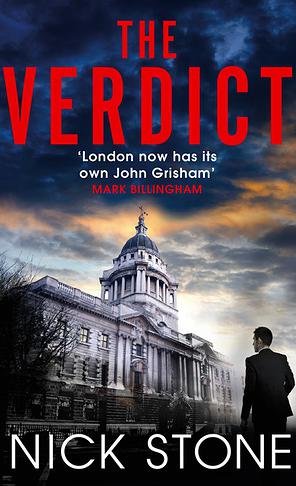The Verdict, by Nick Stone
Reviewed by Paul Magrath When the drugged, strangled corpse of a blonde in a green dress is found in the bedroom of hedge fund honcho Vernon James’s trashed hotel suite, the morning after the gala awards ceremony where he was awarded the Ethical Man of the Year prize, his protestations of innocence meet a wall… Continue reading
Reviewed by Paul Magrath
When the drugged, strangled corpse of a blonde in a green dress is found in the bedroom of hedge fund honcho Vernon James’s trashed hotel suite, the morning after the gala awards ceremony where he was awarded the Ethical Man of the Year prize, his protestations of innocence meet a wall of unbelief.
When further evidence emerges showing that the victim was drugged with rohypnol and that Vernon has a history of injuring escort girls and then buying their silence with generous payoffs, things can only get worse.
Will anyone believe his complicated account of a honeytrap set-up involving another woman in a different green dress, who spiked his drink, lured him into making advances and then beat him up? But who was she working for? And where is she now?
As in all good legal thrillers, there’s at least one person who does, albeit somewhat reluctantly, believe in the presumption of innocence – even for as unsavoury a defendant as Vernon James.
In this case, it’s a solicitors’ clerk called Terry Flynt who just happens to have an awkward personal history with Vernon, having grown up with him in Stevenage some twenty years before, and fallen out with him while they were both at Cambridge. Since then Terry’s life has nosedived while Vernon’s has ascended to the dizzy heights of financial wealth and glamour, plus marriage to Terry’s gorgeous ex-girlfriend.
So there’s no particular reason why Terry should want to help his former friend get out of the fix he seems so richly to deserve. But Terry’s firm don’t know any of this. They think he’s keen to develop his career in the law, and they assign him to the case, alongside a grizzled ex-alky private eye, and together they begin to unpick the tapestry of deceit and uncover the conspiracy against Vernon.
But will they get the evidence they need to dissuade the jury at the Old Bailey in what the prosecution, led by the smoothly persuasive Franco Carnivale QC, present as an open and shut case?
Nick Stone did work for a while as a legal clerk and his step by step account of the arduous process of evidence gathering, fact checking and witness interviewing rings true. Less convincing were some of the aspects of the trial scenes, for example his repeated references to Old Bailey judges banging gavels, and his confusion about the difference between cross-examination, which you do with the other side’s witnesses, and examination in chief (or re-examination) which you do with your own. These quibbles aside, the trial scenes are entirely convincing.
The long build-up to the trial scene which comes at the climax of the narrative is almost too authentically painstaking in its drawn-out proceduralism. There were also times when I felt Terry, as narrator, did not trust his readership to draw the correct inferences or to remember aspects of his personal history that he had already gone through more than once. The book is probably too long as a result.
But even with its imperfections, it is a gripping story, and would, in my learned submission, make an excellent TV mini-series.
